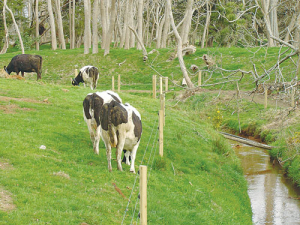New rules excluding stock from waterways are coming, but they have to be sensible, practical and affordable, says Cathy Begley, leader of Federated Farmers’ water team.
Begley told attendees at the recent Feds South Island high country group conference that the proposals could affect the way they run their farms.
She says that since the Minister for the Environment, Dr Nick Smith, and the Minister for Primary Industries, Nathan Guy, announced in February the goal of having 90% of rivers swimmable, her group has been making submissions on how farmers could be affected.
The first thing farmers would ask is whether their farms are “in or out”, but at the moment “we don’t know,” Begley adds.
Under the proposals, land would come under different rules and start dates depending on the slope of the land, defined as ‘plains’ (0-3 degrees slope), ‘rolling’ (3-15 deg.) and ‘steeper’ (15 deg. or steeper).
Begley says it’s not clear how slopes would be classified and the ministry seems to think it would depend on farmers’ “best guess.”
“And if you’re not sure, then hive off to your local regional council and ask them to come out and have a chat with you about whether or not you need to do something in your various paddocks.”
Begley says Federated Farmers does not want a national regulation saying “thou shalt fence” because it depends on the situation. While the only way to keep deer out of a waterway may be to fence, cows work out pretty quickly not to go into soft-bottomed streams because they get stuck, or there may already be a cliff, bank or hedge acting as a barrier.
She adds that on the flattest land, the proposals call for keeping stock out of all waterways. “It could be 30mm wide and then, theoretically, you should keep your stock out of it.”
Also, the draft rules’ inclusion of the term ‘lakes’ inadvertently captures stock water dams. Particularly in the high country, stock water reticulation often isn’t feasible, so stock water races and dams are vital.
“So we’ve been quite vigorously telling MFE and MPI that if you’ve got farm infrastructure like stock water dams and races, they are there to allow stock access to drinking water; keeping them out of it isn’t a good idea,” she says.
“I think they’ve got that, but I’m not sure.”
Federated Farmers believes no national regulation should trump a regional rule where a regional council has been out and talked with its farmers and come up with a practical regional rule that works for the area.
“We’ve also been saying that our farmers need to be able to pick something up and work out easily whether or not this regulation applies to them. You shouldn’t have to go through a process of guessing then maybe going to the regional council and having an argument about whether or not you’re in or out.”
Begley believes there would have to be many more exemptions than MPI expects, especially on rolling country.
“That’s just purely because of how your paddocks are set up. Putting a fence there might not necessarily be the best idea. That may actually mean your stock camp next to your waterways. For deer, if all of a sudden you’ve got a fence next to a waterway, they start running up and down it,” she explains
“Our concern is that once we head into a national regulation that sets out ‘in stone’ what a farm plan [must] look like, what good farming practices are and what they look like, all of a sudden we’re starting to lock land use into quite a constrained thing which then takes away the necessary flexibility you guys need to run your business.”











